HI6027 Business and Corporate Law Group Assignment Case Studies
VerifiedAdded on 2022/09/21
|9
|2281
|16
Report
AI Summary
This report presents a comprehensive analysis of two business law case studies, addressing key legal issues related to contract law and corporate law. The first case examines the enforceability of a promotional offer by SOO Burgers, analyzing whether the company is obligated to provide a Mazda CX-9 to Mickey and Brett, considering the principles of offer, acceptance, and revocation. The second case delves into corporate law, focusing on the actions of Sparkling, a company, and its managing director, Sarah, concerning a loan agreement with Costello Bank. The analysis explores the application of the Corporations Act 2001 (Cth), including sections 125 and 126, the rule of indoor management (Turquand’s Rule), and the validity of actions exceeding the company's constitution. The report considers the bank's rights, the impact of Sarah's actions, and the potential outcomes if the loan's purpose was to refurbish clothing shops or if there was a disagreement between the board and Sarah. The report applies relevant legal rules and cases to the facts, providing a well-reasoned conclusion for each scenario.
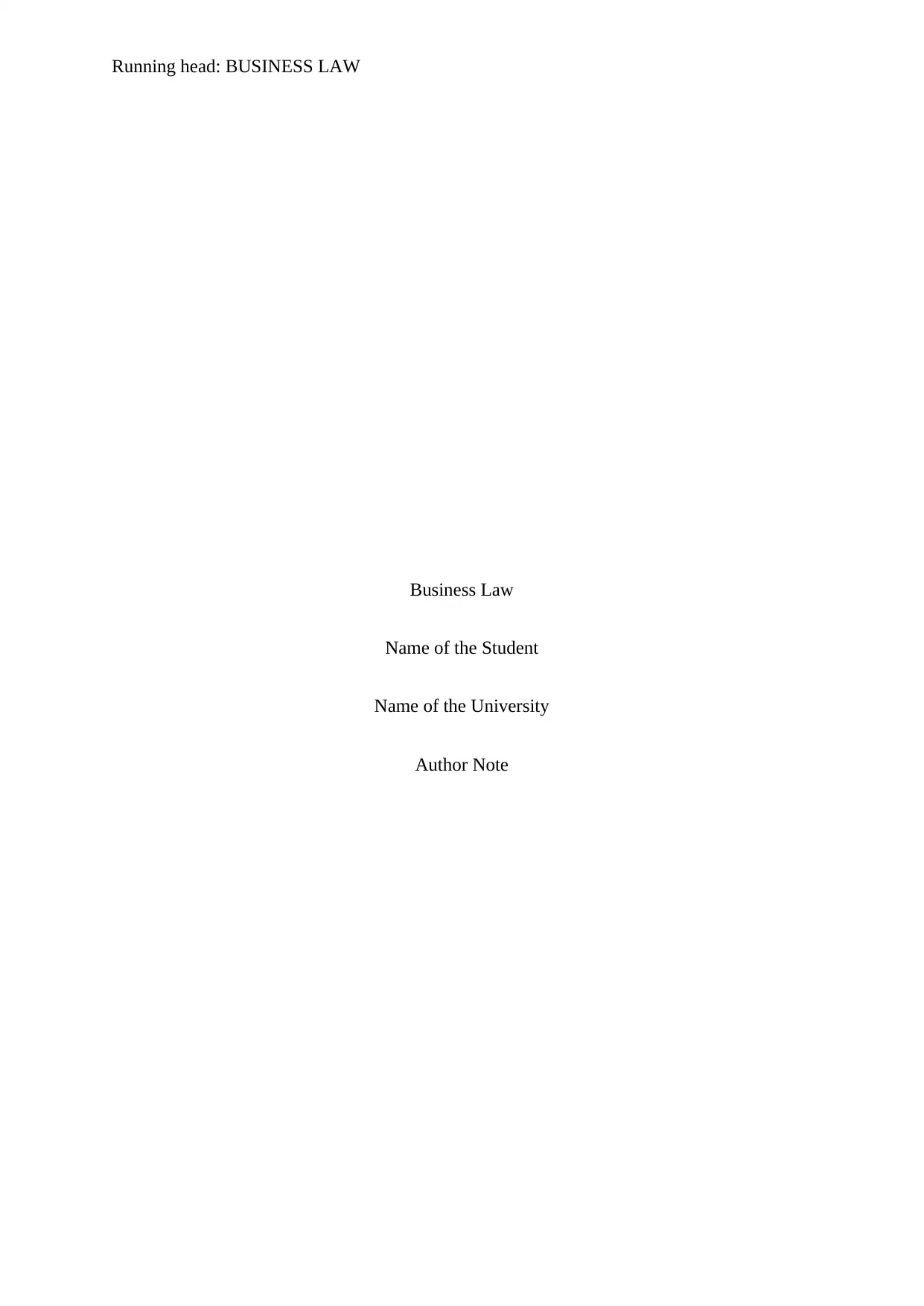
Running head: BUSINESS LAW
Business Law
Name of the Student
Name of the University
Author Note
Business Law
Name of the Student
Name of the University
Author Note
Paraphrase This Document
Need a fresh take? Get an instant paraphrase of this document with our AI Paraphraser
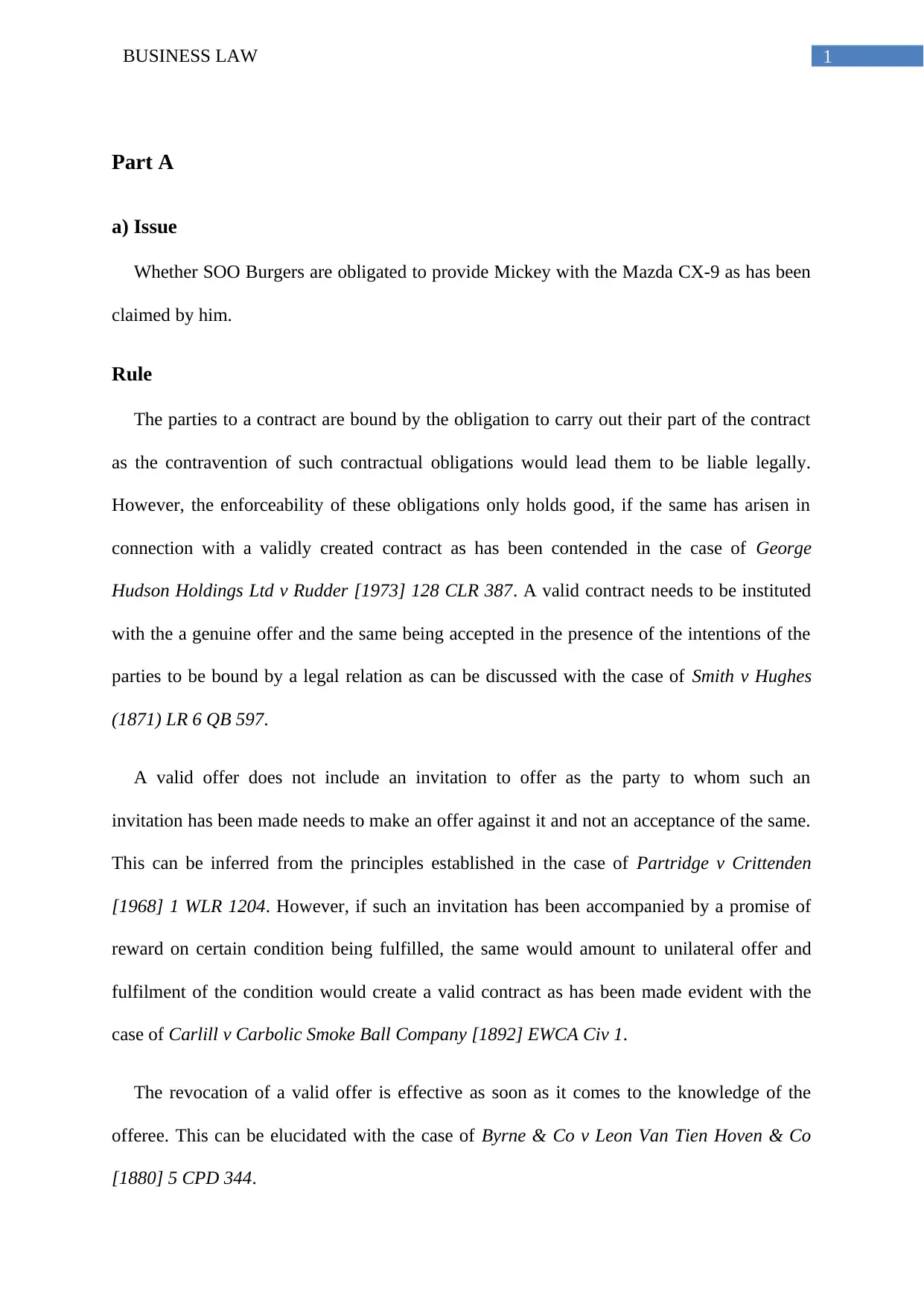
1BUSINESS LAW
Part A
a) Issue
Whether SOO Burgers are obligated to provide Mickey with the Mazda CX-9 as has been
claimed by him.
Rule
The parties to a contract are bound by the obligation to carry out their part of the contract
as the contravention of such contractual obligations would lead them to be liable legally.
However, the enforceability of these obligations only holds good, if the same has arisen in
connection with a validly created contract as has been contended in the case of George
Hudson Holdings Ltd v Rudder [1973] 128 CLR 387. A valid contract needs to be instituted
with the a genuine offer and the same being accepted in the presence of the intentions of the
parties to be bound by a legal relation as can be discussed with the case of Smith v Hughes
(1871) LR 6 QB 597.
A valid offer does not include an invitation to offer as the party to whom such an
invitation has been made needs to make an offer against it and not an acceptance of the same.
This can be inferred from the principles established in the case of Partridge v Crittenden
[1968] 1 WLR 1204. However, if such an invitation has been accompanied by a promise of
reward on certain condition being fulfilled, the same would amount to unilateral offer and
fulfilment of the condition would create a valid contract as has been made evident with the
case of Carlill v Carbolic Smoke Ball Company [1892] EWCA Civ 1.
The revocation of a valid offer is effective as soon as it comes to the knowledge of the
offeree. This can be elucidated with the case of Byrne & Co v Leon Van Tien Hoven & Co
[1880] 5 CPD 344.
Part A
a) Issue
Whether SOO Burgers are obligated to provide Mickey with the Mazda CX-9 as has been
claimed by him.
Rule
The parties to a contract are bound by the obligation to carry out their part of the contract
as the contravention of such contractual obligations would lead them to be liable legally.
However, the enforceability of these obligations only holds good, if the same has arisen in
connection with a validly created contract as has been contended in the case of George
Hudson Holdings Ltd v Rudder [1973] 128 CLR 387. A valid contract needs to be instituted
with the a genuine offer and the same being accepted in the presence of the intentions of the
parties to be bound by a legal relation as can be discussed with the case of Smith v Hughes
(1871) LR 6 QB 597.
A valid offer does not include an invitation to offer as the party to whom such an
invitation has been made needs to make an offer against it and not an acceptance of the same.
This can be inferred from the principles established in the case of Partridge v Crittenden
[1968] 1 WLR 1204. However, if such an invitation has been accompanied by a promise of
reward on certain condition being fulfilled, the same would amount to unilateral offer and
fulfilment of the condition would create a valid contract as has been made evident with the
case of Carlill v Carbolic Smoke Ball Company [1892] EWCA Civ 1.
The revocation of a valid offer is effective as soon as it comes to the knowledge of the
offeree. This can be elucidated with the case of Byrne & Co v Leon Van Tien Hoven & Co
[1880] 5 CPD 344.
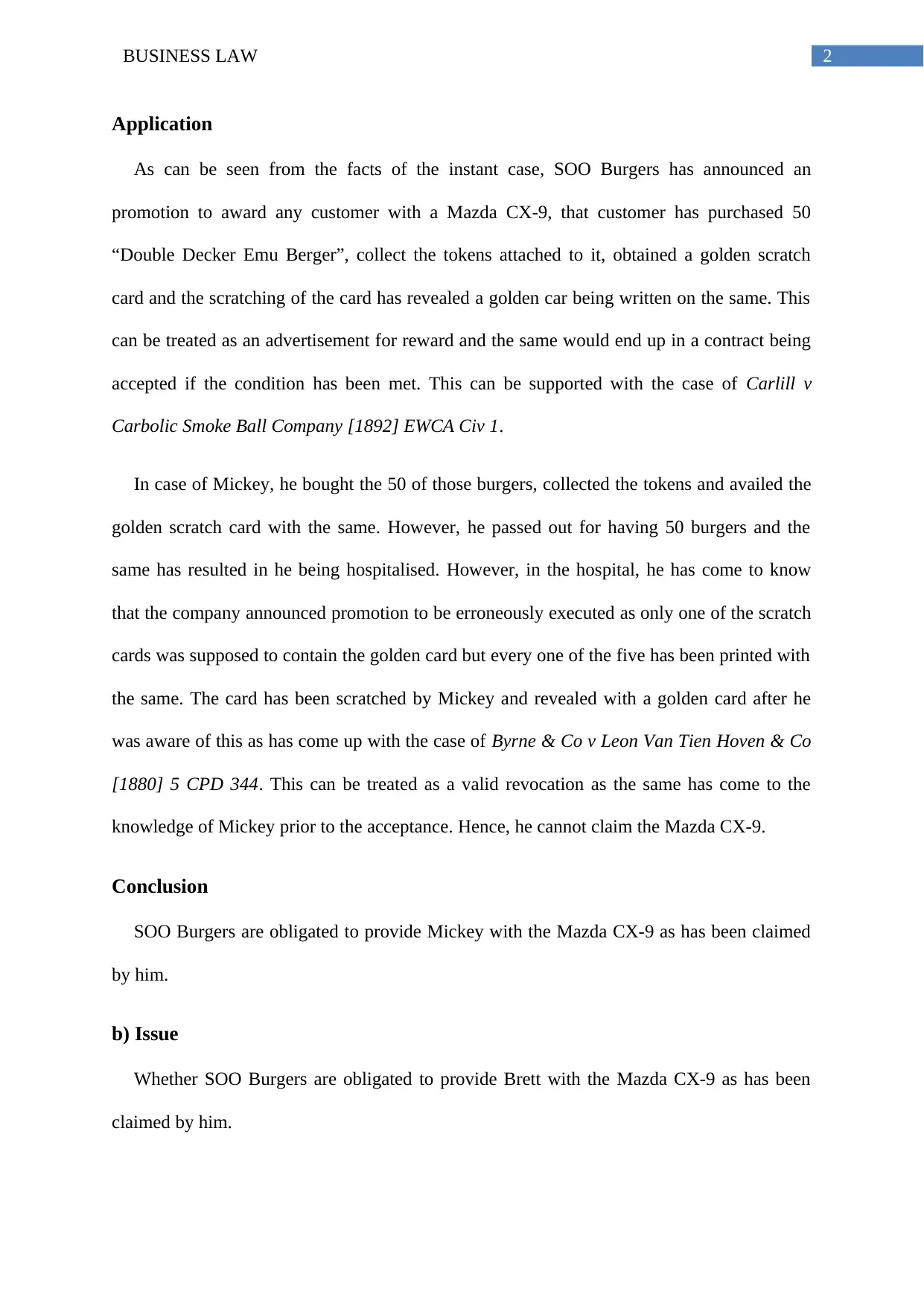
2BUSINESS LAW
Application
As can be seen from the facts of the instant case, SOO Burgers has announced an
promotion to award any customer with a Mazda CX-9, that customer has purchased 50
“Double Decker Emu Berger”, collect the tokens attached to it, obtained a golden scratch
card and the scratching of the card has revealed a golden car being written on the same. This
can be treated as an advertisement for reward and the same would end up in a contract being
accepted if the condition has been met. This can be supported with the case of Carlill v
Carbolic Smoke Ball Company [1892] EWCA Civ 1.
In case of Mickey, he bought the 50 of those burgers, collected the tokens and availed the
golden scratch card with the same. However, he passed out for having 50 burgers and the
same has resulted in he being hospitalised. However, in the hospital, he has come to know
that the company announced promotion to be erroneously executed as only one of the scratch
cards was supposed to contain the golden card but every one of the five has been printed with
the same. The card has been scratched by Mickey and revealed with a golden card after he
was aware of this as has come up with the case of Byrne & Co v Leon Van Tien Hoven & Co
[1880] 5 CPD 344. This can be treated as a valid revocation as the same has come to the
knowledge of Mickey prior to the acceptance. Hence, he cannot claim the Mazda CX-9.
Conclusion
SOO Burgers are obligated to provide Mickey with the Mazda CX-9 as has been claimed
by him.
b) Issue
Whether SOO Burgers are obligated to provide Brett with the Mazda CX-9 as has been
claimed by him.
Application
As can be seen from the facts of the instant case, SOO Burgers has announced an
promotion to award any customer with a Mazda CX-9, that customer has purchased 50
“Double Decker Emu Berger”, collect the tokens attached to it, obtained a golden scratch
card and the scratching of the card has revealed a golden car being written on the same. This
can be treated as an advertisement for reward and the same would end up in a contract being
accepted if the condition has been met. This can be supported with the case of Carlill v
Carbolic Smoke Ball Company [1892] EWCA Civ 1.
In case of Mickey, he bought the 50 of those burgers, collected the tokens and availed the
golden scratch card with the same. However, he passed out for having 50 burgers and the
same has resulted in he being hospitalised. However, in the hospital, he has come to know
that the company announced promotion to be erroneously executed as only one of the scratch
cards was supposed to contain the golden card but every one of the five has been printed with
the same. The card has been scratched by Mickey and revealed with a golden card after he
was aware of this as has come up with the case of Byrne & Co v Leon Van Tien Hoven & Co
[1880] 5 CPD 344. This can be treated as a valid revocation as the same has come to the
knowledge of Mickey prior to the acceptance. Hence, he cannot claim the Mazda CX-9.
Conclusion
SOO Burgers are obligated to provide Mickey with the Mazda CX-9 as has been claimed
by him.
b) Issue
Whether SOO Burgers are obligated to provide Brett with the Mazda CX-9 as has been
claimed by him.
⊘ This is a preview!⊘
Do you want full access?
Subscribe today to unlock all pages.

Trusted by 1+ million students worldwide
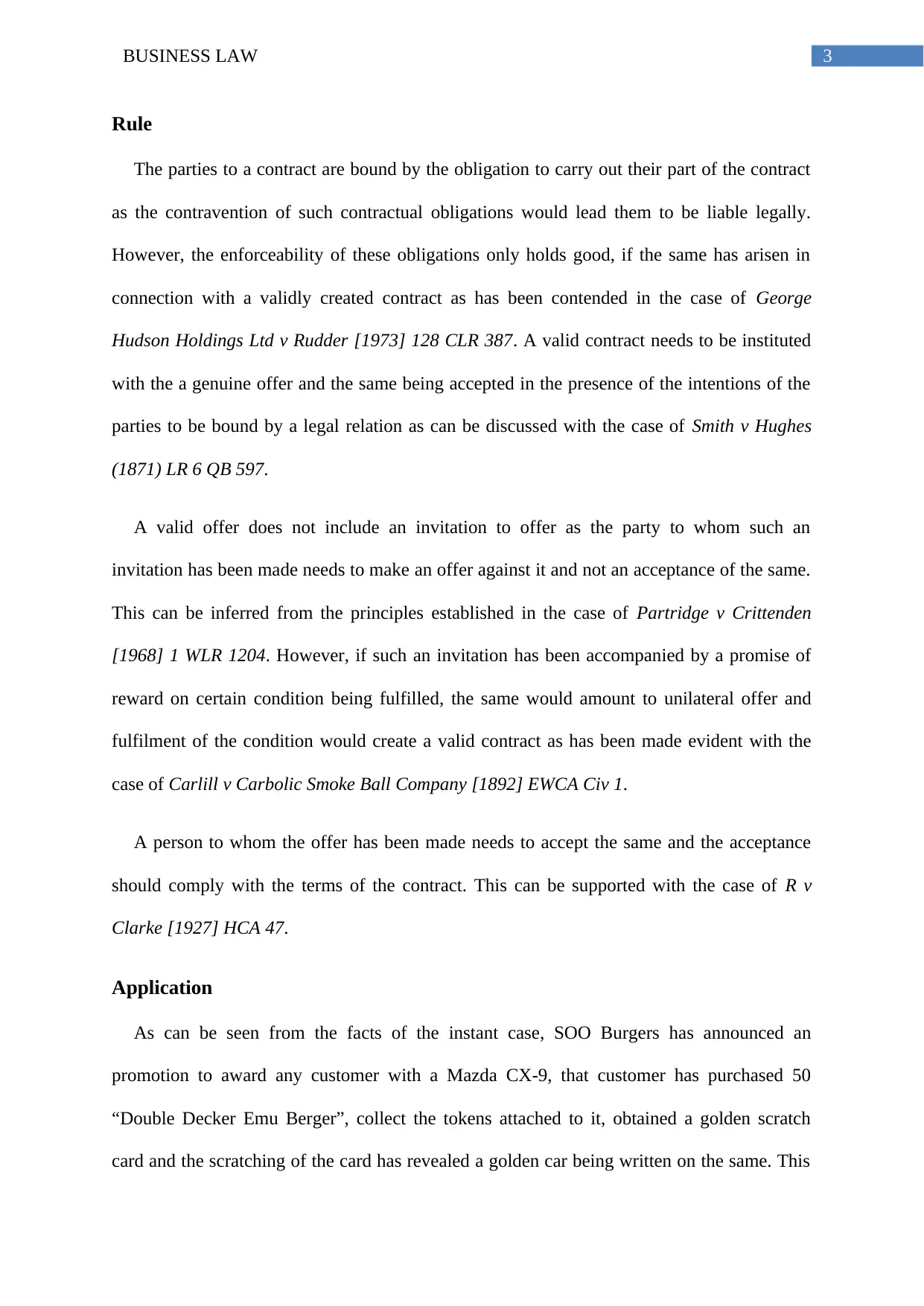
3BUSINESS LAW
Rule
The parties to a contract are bound by the obligation to carry out their part of the contract
as the contravention of such contractual obligations would lead them to be liable legally.
However, the enforceability of these obligations only holds good, if the same has arisen in
connection with a validly created contract as has been contended in the case of George
Hudson Holdings Ltd v Rudder [1973] 128 CLR 387. A valid contract needs to be instituted
with the a genuine offer and the same being accepted in the presence of the intentions of the
parties to be bound by a legal relation as can be discussed with the case of Smith v Hughes
(1871) LR 6 QB 597.
A valid offer does not include an invitation to offer as the party to whom such an
invitation has been made needs to make an offer against it and not an acceptance of the same.
This can be inferred from the principles established in the case of Partridge v Crittenden
[1968] 1 WLR 1204. However, if such an invitation has been accompanied by a promise of
reward on certain condition being fulfilled, the same would amount to unilateral offer and
fulfilment of the condition would create a valid contract as has been made evident with the
case of Carlill v Carbolic Smoke Ball Company [1892] EWCA Civ 1.
A person to whom the offer has been made needs to accept the same and the acceptance
should comply with the terms of the contract. This can be supported with the case of R v
Clarke [1927] HCA 47.
Application
As can be seen from the facts of the instant case, SOO Burgers has announced an
promotion to award any customer with a Mazda CX-9, that customer has purchased 50
“Double Decker Emu Berger”, collect the tokens attached to it, obtained a golden scratch
card and the scratching of the card has revealed a golden car being written on the same. This
Rule
The parties to a contract are bound by the obligation to carry out their part of the contract
as the contravention of such contractual obligations would lead them to be liable legally.
However, the enforceability of these obligations only holds good, if the same has arisen in
connection with a validly created contract as has been contended in the case of George
Hudson Holdings Ltd v Rudder [1973] 128 CLR 387. A valid contract needs to be instituted
with the a genuine offer and the same being accepted in the presence of the intentions of the
parties to be bound by a legal relation as can be discussed with the case of Smith v Hughes
(1871) LR 6 QB 597.
A valid offer does not include an invitation to offer as the party to whom such an
invitation has been made needs to make an offer against it and not an acceptance of the same.
This can be inferred from the principles established in the case of Partridge v Crittenden
[1968] 1 WLR 1204. However, if such an invitation has been accompanied by a promise of
reward on certain condition being fulfilled, the same would amount to unilateral offer and
fulfilment of the condition would create a valid contract as has been made evident with the
case of Carlill v Carbolic Smoke Ball Company [1892] EWCA Civ 1.
A person to whom the offer has been made needs to accept the same and the acceptance
should comply with the terms of the contract. This can be supported with the case of R v
Clarke [1927] HCA 47.
Application
As can be seen from the facts of the instant case, SOO Burgers has announced an
promotion to award any customer with a Mazda CX-9, that customer has purchased 50
“Double Decker Emu Berger”, collect the tokens attached to it, obtained a golden scratch
card and the scratching of the card has revealed a golden car being written on the same. This
Paraphrase This Document
Need a fresh take? Get an instant paraphrase of this document with our AI Paraphraser
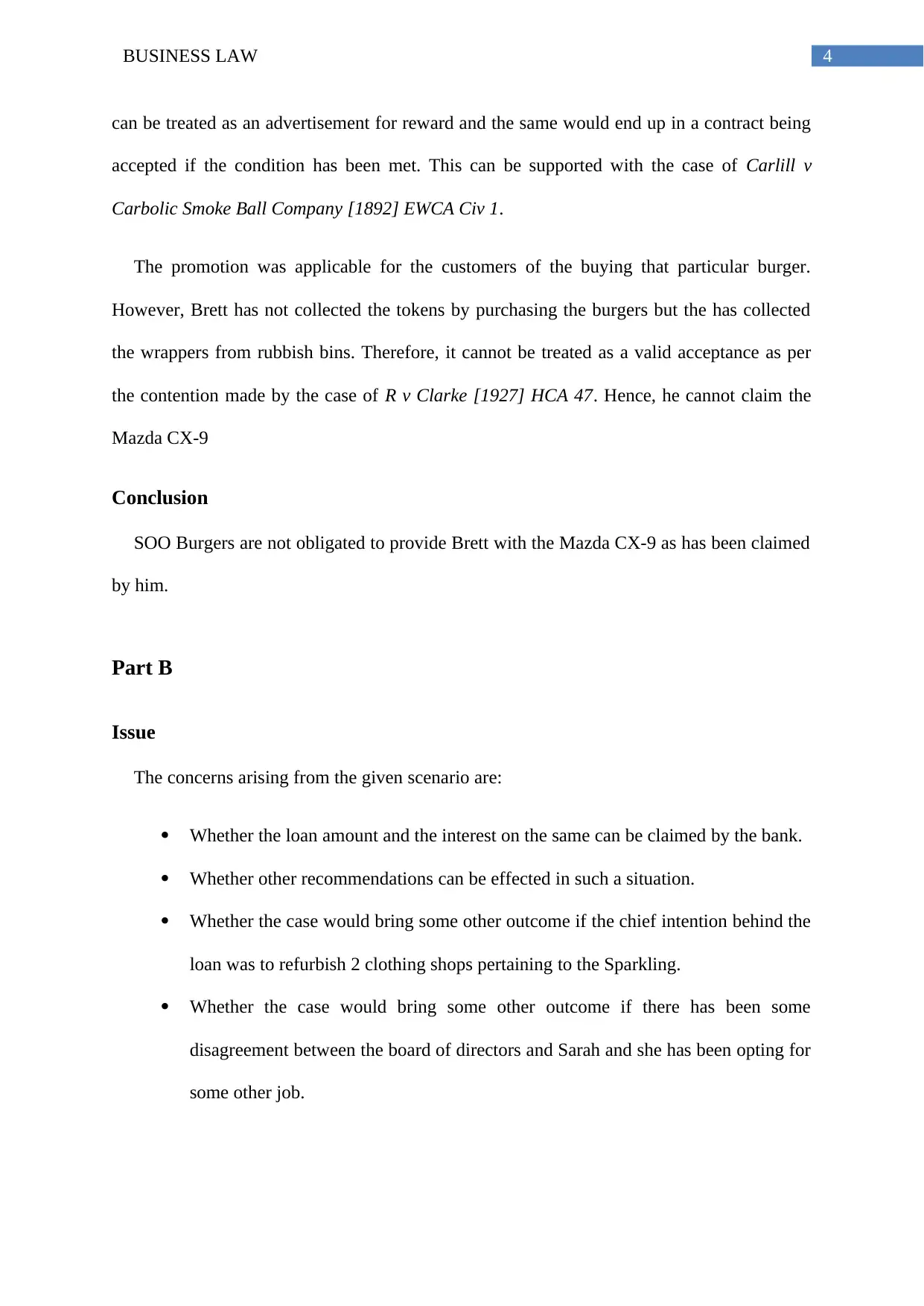
4BUSINESS LAW
can be treated as an advertisement for reward and the same would end up in a contract being
accepted if the condition has been met. This can be supported with the case of Carlill v
Carbolic Smoke Ball Company [1892] EWCA Civ 1.
The promotion was applicable for the customers of the buying that particular burger.
However, Brett has not collected the tokens by purchasing the burgers but the has collected
the wrappers from rubbish bins. Therefore, it cannot be treated as a valid acceptance as per
the contention made by the case of R v Clarke [1927] HCA 47. Hence, he cannot claim the
Mazda CX-9
Conclusion
SOO Burgers are not obligated to provide Brett with the Mazda CX-9 as has been claimed
by him.
Part B
Issue
The concerns arising from the given scenario are:
Whether the loan amount and the interest on the same can be claimed by the bank.
Whether other recommendations can be effected in such a situation.
Whether the case would bring some other outcome if the chief intention behind the
loan was to refurbish 2 clothing shops pertaining to the Sparkling.
Whether the case would bring some other outcome if there has been some
disagreement between the board of directors and Sarah and she has been opting for
some other job.
can be treated as an advertisement for reward and the same would end up in a contract being
accepted if the condition has been met. This can be supported with the case of Carlill v
Carbolic Smoke Ball Company [1892] EWCA Civ 1.
The promotion was applicable for the customers of the buying that particular burger.
However, Brett has not collected the tokens by purchasing the burgers but the has collected
the wrappers from rubbish bins. Therefore, it cannot be treated as a valid acceptance as per
the contention made by the case of R v Clarke [1927] HCA 47. Hence, he cannot claim the
Mazda CX-9
Conclusion
SOO Burgers are not obligated to provide Brett with the Mazda CX-9 as has been claimed
by him.
Part B
Issue
The concerns arising from the given scenario are:
Whether the loan amount and the interest on the same can be claimed by the bank.
Whether other recommendations can be effected in such a situation.
Whether the case would bring some other outcome if the chief intention behind the
loan was to refurbish 2 clothing shops pertaining to the Sparkling.
Whether the case would bring some other outcome if there has been some
disagreement between the board of directors and Sarah and she has been opting for
some other job.
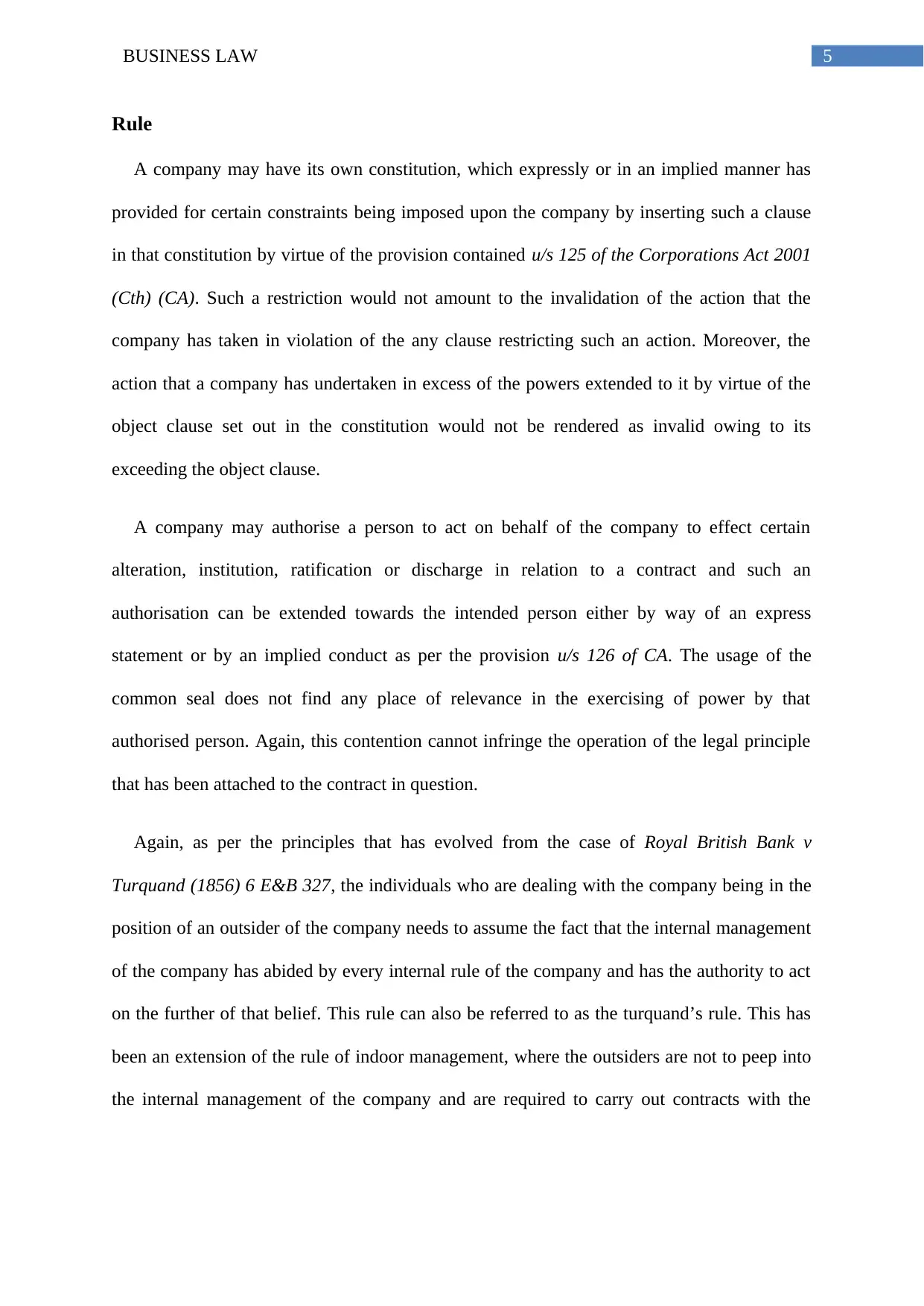
5BUSINESS LAW
Rule
A company may have its own constitution, which expressly or in an implied manner has
provided for certain constraints being imposed upon the company by inserting such a clause
in that constitution by virtue of the provision contained u/s 125 of the Corporations Act 2001
(Cth) (CA). Such a restriction would not amount to the invalidation of the action that the
company has taken in violation of the any clause restricting such an action. Moreover, the
action that a company has undertaken in excess of the powers extended to it by virtue of the
object clause set out in the constitution would not be rendered as invalid owing to its
exceeding the object clause.
A company may authorise a person to act on behalf of the company to effect certain
alteration, institution, ratification or discharge in relation to a contract and such an
authorisation can be extended towards the intended person either by way of an express
statement or by an implied conduct as per the provision u/s 126 of CA. The usage of the
common seal does not find any place of relevance in the exercising of power by that
authorised person. Again, this contention cannot infringe the operation of the legal principle
that has been attached to the contract in question.
Again, as per the principles that has evolved from the case of Royal British Bank v
Turquand (1856) 6 E&B 327, the individuals who are dealing with the company being in the
position of an outsider of the company needs to assume the fact that the internal management
of the company has abided by every internal rule of the company and has the authority to act
on the further of that belief. This rule can also be referred to as the turquand’s rule. This has
been an extension of the rule of indoor management, where the outsiders are not to peep into
the internal management of the company and are required to carry out contracts with the
Rule
A company may have its own constitution, which expressly or in an implied manner has
provided for certain constraints being imposed upon the company by inserting such a clause
in that constitution by virtue of the provision contained u/s 125 of the Corporations Act 2001
(Cth) (CA). Such a restriction would not amount to the invalidation of the action that the
company has taken in violation of the any clause restricting such an action. Moreover, the
action that a company has undertaken in excess of the powers extended to it by virtue of the
object clause set out in the constitution would not be rendered as invalid owing to its
exceeding the object clause.
A company may authorise a person to act on behalf of the company to effect certain
alteration, institution, ratification or discharge in relation to a contract and such an
authorisation can be extended towards the intended person either by way of an express
statement or by an implied conduct as per the provision u/s 126 of CA. The usage of the
common seal does not find any place of relevance in the exercising of power by that
authorised person. Again, this contention cannot infringe the operation of the legal principle
that has been attached to the contract in question.
Again, as per the principles that has evolved from the case of Royal British Bank v
Turquand (1856) 6 E&B 327, the individuals who are dealing with the company being in the
position of an outsider of the company needs to assume the fact that the internal management
of the company has abided by every internal rule of the company and has the authority to act
on the further of that belief. This rule can also be referred to as the turquand’s rule. This has
been an extension of the rule of indoor management, where the outsiders are not to peep into
the internal management of the company and are required to carry out contracts with the
⊘ This is a preview!⊘
Do you want full access?
Subscribe today to unlock all pages.

Trusted by 1+ million students worldwide
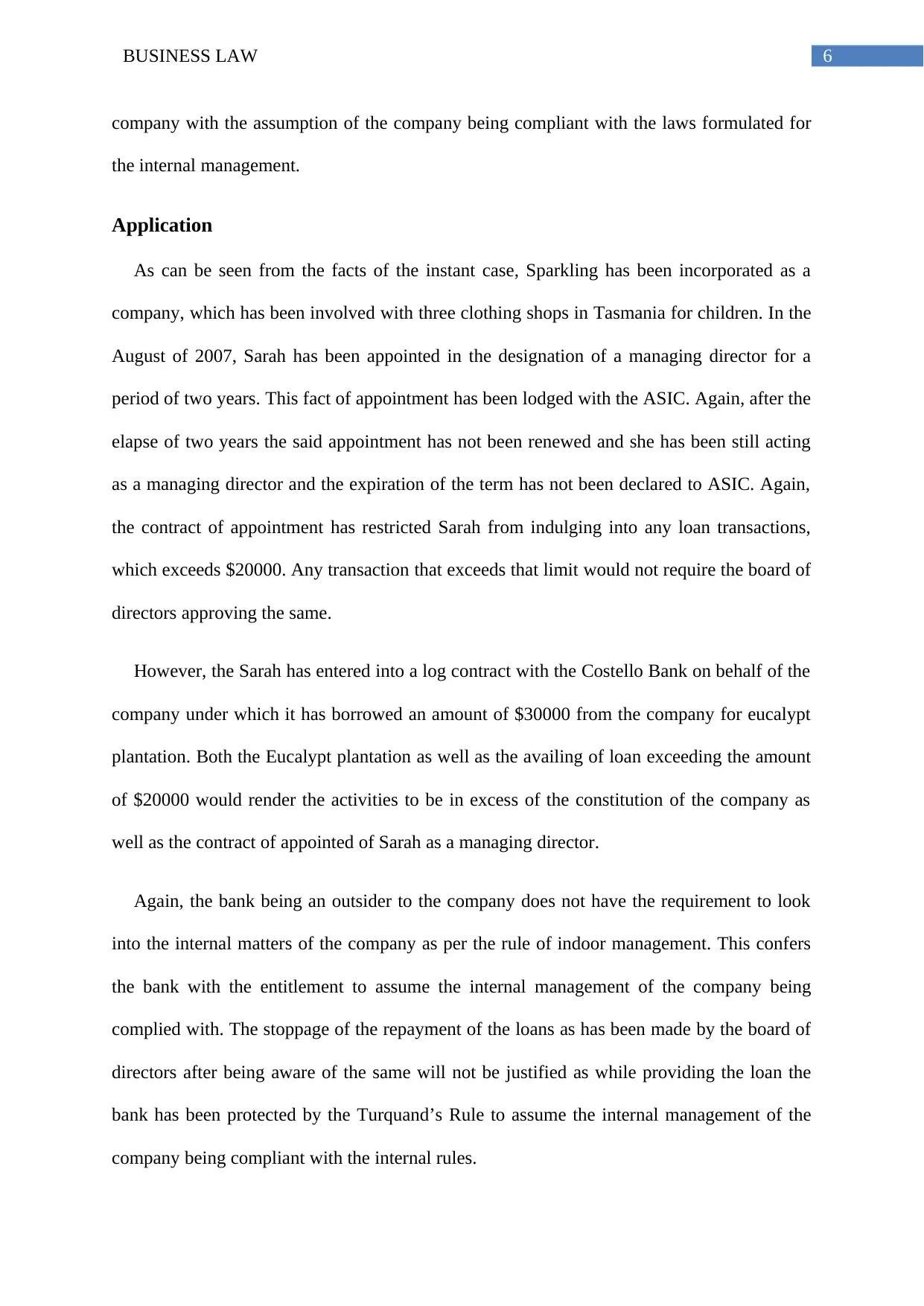
6BUSINESS LAW
company with the assumption of the company being compliant with the laws formulated for
the internal management.
Application
As can be seen from the facts of the instant case, Sparkling has been incorporated as a
company, which has been involved with three clothing shops in Tasmania for children. In the
August of 2007, Sarah has been appointed in the designation of a managing director for a
period of two years. This fact of appointment has been lodged with the ASIC. Again, after the
elapse of two years the said appointment has not been renewed and she has been still acting
as a managing director and the expiration of the term has not been declared to ASIC. Again,
the contract of appointment has restricted Sarah from indulging into any loan transactions,
which exceeds $20000. Any transaction that exceeds that limit would not require the board of
directors approving the same.
However, the Sarah has entered into a log contract with the Costello Bank on behalf of the
company under which it has borrowed an amount of $30000 from the company for eucalypt
plantation. Both the Eucalypt plantation as well as the availing of loan exceeding the amount
of $20000 would render the activities to be in excess of the constitution of the company as
well as the contract of appointed of Sarah as a managing director.
Again, the bank being an outsider to the company does not have the requirement to look
into the internal matters of the company as per the rule of indoor management. This confers
the bank with the entitlement to assume the internal management of the company being
complied with. The stoppage of the repayment of the loans as has been made by the board of
directors after being aware of the same will not be justified as while providing the loan the
bank has been protected by the Turquand’s Rule to assume the internal management of the
company being compliant with the internal rules.
company with the assumption of the company being compliant with the laws formulated for
the internal management.
Application
As can be seen from the facts of the instant case, Sparkling has been incorporated as a
company, which has been involved with three clothing shops in Tasmania for children. In the
August of 2007, Sarah has been appointed in the designation of a managing director for a
period of two years. This fact of appointment has been lodged with the ASIC. Again, after the
elapse of two years the said appointment has not been renewed and she has been still acting
as a managing director and the expiration of the term has not been declared to ASIC. Again,
the contract of appointment has restricted Sarah from indulging into any loan transactions,
which exceeds $20000. Any transaction that exceeds that limit would not require the board of
directors approving the same.
However, the Sarah has entered into a log contract with the Costello Bank on behalf of the
company under which it has borrowed an amount of $30000 from the company for eucalypt
plantation. Both the Eucalypt plantation as well as the availing of loan exceeding the amount
of $20000 would render the activities to be in excess of the constitution of the company as
well as the contract of appointed of Sarah as a managing director.
Again, the bank being an outsider to the company does not have the requirement to look
into the internal matters of the company as per the rule of indoor management. This confers
the bank with the entitlement to assume the internal management of the company being
complied with. The stoppage of the repayment of the loans as has been made by the board of
directors after being aware of the same will not be justified as while providing the loan the
bank has been protected by the Turquand’s Rule to assume the internal management of the
company being compliant with the internal rules.
Paraphrase This Document
Need a fresh take? Get an instant paraphrase of this document with our AI Paraphraser
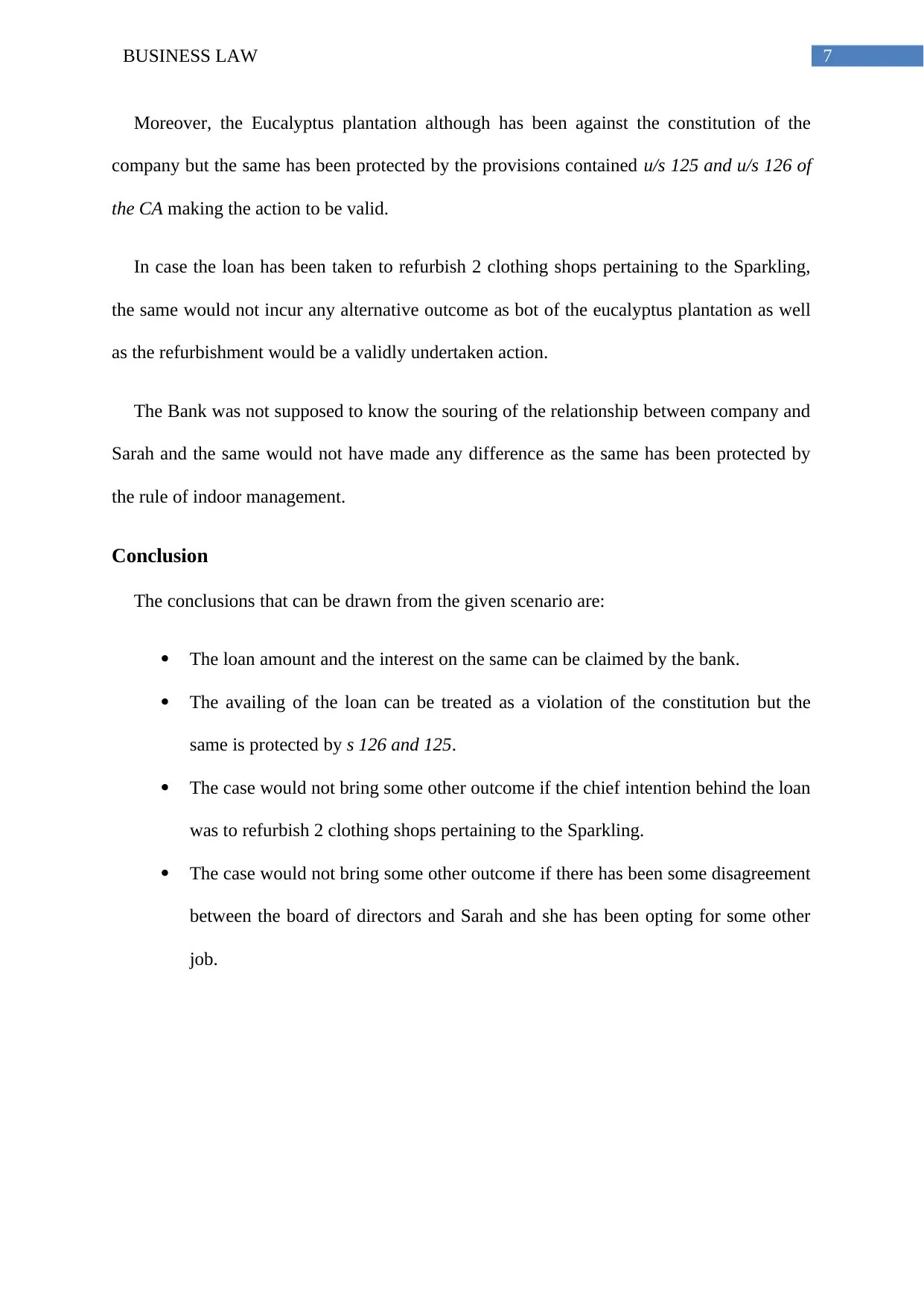
7BUSINESS LAW
Moreover, the Eucalyptus plantation although has been against the constitution of the
company but the same has been protected by the provisions contained u/s 125 and u/s 126 of
the CA making the action to be valid.
In case the loan has been taken to refurbish 2 clothing shops pertaining to the Sparkling,
the same would not incur any alternative outcome as bot of the eucalyptus plantation as well
as the refurbishment would be a validly undertaken action.
The Bank was not supposed to know the souring of the relationship between company and
Sarah and the same would not have made any difference as the same has been protected by
the rule of indoor management.
Conclusion
The conclusions that can be drawn from the given scenario are:
The loan amount and the interest on the same can be claimed by the bank.
The availing of the loan can be treated as a violation of the constitution but the
same is protected by s 126 and 125.
The case would not bring some other outcome if the chief intention behind the loan
was to refurbish 2 clothing shops pertaining to the Sparkling.
The case would not bring some other outcome if there has been some disagreement
between the board of directors and Sarah and she has been opting for some other
job.
Moreover, the Eucalyptus plantation although has been against the constitution of the
company but the same has been protected by the provisions contained u/s 125 and u/s 126 of
the CA making the action to be valid.
In case the loan has been taken to refurbish 2 clothing shops pertaining to the Sparkling,
the same would not incur any alternative outcome as bot of the eucalyptus plantation as well
as the refurbishment would be a validly undertaken action.
The Bank was not supposed to know the souring of the relationship between company and
Sarah and the same would not have made any difference as the same has been protected by
the rule of indoor management.
Conclusion
The conclusions that can be drawn from the given scenario are:
The loan amount and the interest on the same can be claimed by the bank.
The availing of the loan can be treated as a violation of the constitution but the
same is protected by s 126 and 125.
The case would not bring some other outcome if the chief intention behind the loan
was to refurbish 2 clothing shops pertaining to the Sparkling.
The case would not bring some other outcome if there has been some disagreement
between the board of directors and Sarah and she has been opting for some other
job.
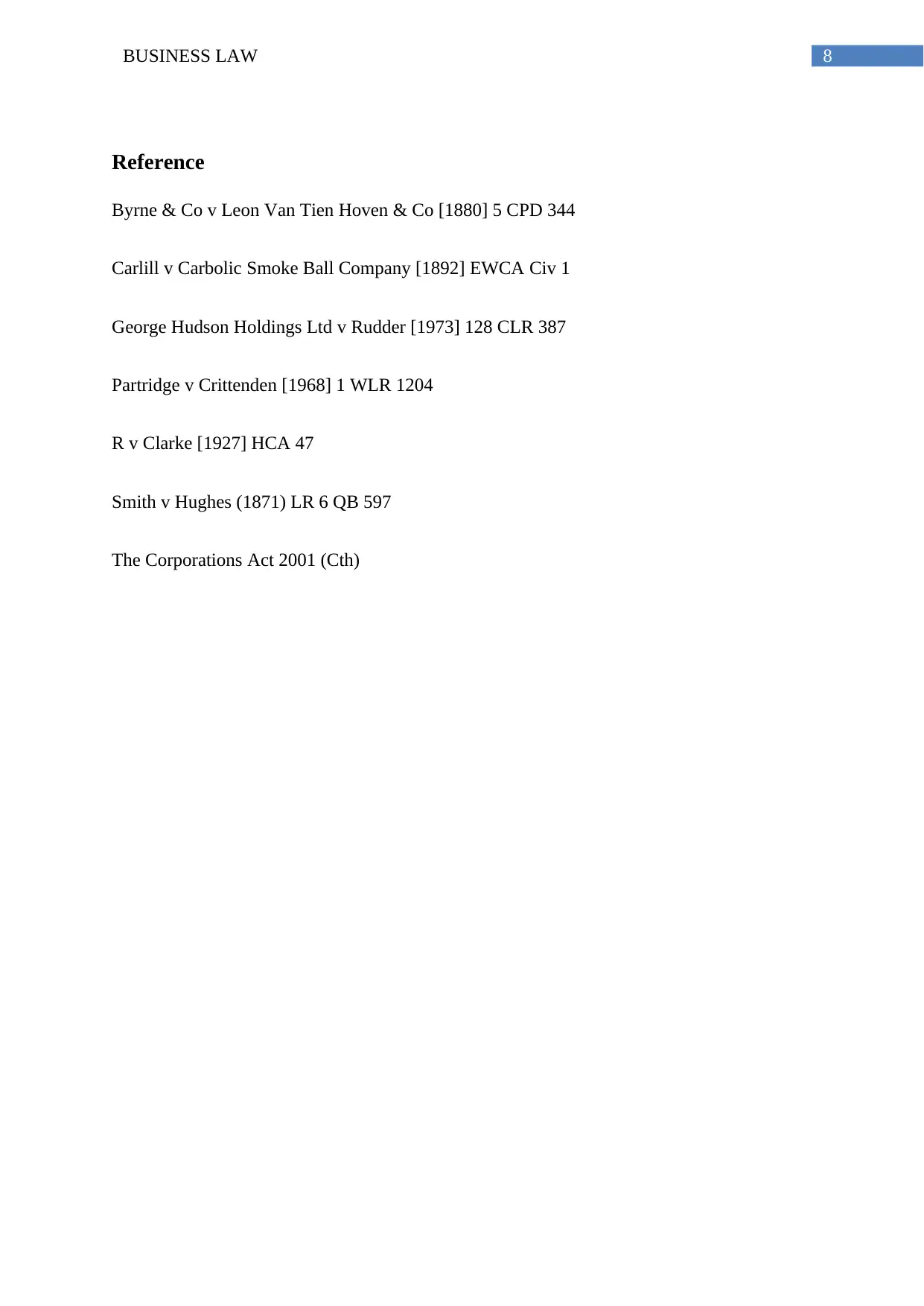
8BUSINESS LAW
Reference
Byrne & Co v Leon Van Tien Hoven & Co [1880] 5 CPD 344
Carlill v Carbolic Smoke Ball Company [1892] EWCA Civ 1
George Hudson Holdings Ltd v Rudder [1973] 128 CLR 387
Partridge v Crittenden [1968] 1 WLR 1204
R v Clarke [1927] HCA 47
Smith v Hughes (1871) LR 6 QB 597
The Corporations Act 2001 (Cth)
Reference
Byrne & Co v Leon Van Tien Hoven & Co [1880] 5 CPD 344
Carlill v Carbolic Smoke Ball Company [1892] EWCA Civ 1
George Hudson Holdings Ltd v Rudder [1973] 128 CLR 387
Partridge v Crittenden [1968] 1 WLR 1204
R v Clarke [1927] HCA 47
Smith v Hughes (1871) LR 6 QB 597
The Corporations Act 2001 (Cth)
⊘ This is a preview!⊘
Do you want full access?
Subscribe today to unlock all pages.

Trusted by 1+ million students worldwide
1 out of 9
Related Documents
Your All-in-One AI-Powered Toolkit for Academic Success.
+13062052269
info@desklib.com
Available 24*7 on WhatsApp / Email
![[object Object]](/_next/static/media/star-bottom.7253800d.svg)
Unlock your academic potential
Copyright © 2020–2026 A2Z Services. All Rights Reserved. Developed and managed by ZUCOL.





